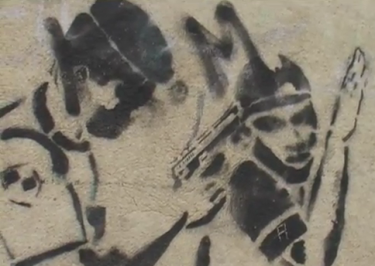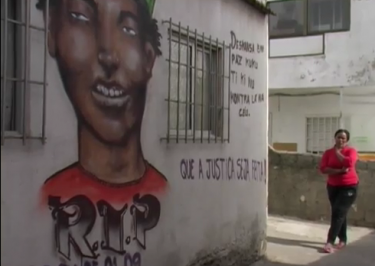[All links lead to Portuguese language pages except when otherwise noted.]
On December 5, 2012, the Criminal Court of Lisbon acquitted a Public Security Police (PSP) agent accused of negligent homicide of a 14-year-old boy in the suburbs of Amadora, in 2009. The announcement of the court's decision reignited the debate about racism and marginalized communities in Portugal, particularly in the outskirts of Lisbon, and multiplied the amount of social media commentary repudiating the Portuguese judicial system.
In January 2009, three PSP agents were patrolling the surrounding areas of Amadora (dressed in plainclothes and in an uncharacterized vehicle), when they cornered a vehicle carrying five robbery suspects, including a minor named Elson Sanches, or Kuku, the son of Cape Verdean immigrants. A chase unfolded, which ended with Kuku shot dead. No one witnessed the incident, except the agent who fired in alleged self-defense.
A few days later, a protest against racism and police violence was organized in Amadora. Passa Palavra collective reported on it and shared a video that features rapper Chullage reading a manifesto asking for justice:
Prepararam-se e orquestraram a propaganda para que tudo o que os media dissessem sobre aquele jovem fosse: era um criminoso. E por isso era legítimo que a polícia o tivesse atingido com uma bala, porque era criminoso. Mas aqui em Portugal existem tribunais, portanto até os criminosos têm que passar pelos tribunais (…). No caso do Kuku foi a pena de morte, executada pela polícia.
They prepared and orchestrated the propaganda so that all that the media would report about that young man was: he was a criminal. And so it was right that the police had struck him with a bullet, because he was criminal. But here in Portugal we have courts, so even the criminals have to go through the courts (…). In the case of Kuku it was the death penalty, executed by police.
Plataforma Gueto collective, which has been closely following the case, stated last November that the ongoing trial was “on the way to becoming yet another case of impunity for the racist executions by the police”. The collective organized a “HIP HOP for justice” concert in solidarity with of the aim of raising funds for the legal costs of the proceedings. Plataforma Gueto is also preparing a documentary titled “Violência Policial e Racismo: O Caso do Kuku” (Police violence and racism: Kuku's case), with the objective of “giving voice to the case of Kuku and to the violent racist situation that runs in the streets, police stations and Portuguese prisons”:
In the verdict, read on December 5, the judge stated that the environmental factors surrounding the incident indicated that the agent's life was in danger, which prompted him to act in such a manner, as reported in more detail by Público newspaper.
SOS Racismo was one of the first organizations to react, calling the agent's acquittal “scandalous” and stressing that this verdict “portrays the profound racism in the Portuguese society”.

Stencil in a wall in Amadora. Screenshot of the documentary “Violência Policial e Racismo: O Caso do Kuku”.
Buala also republished a note of protest by Chullage, which underlined:
Do ponto de vista Racial [a justiça] também tem funcionado perfeitamente. Legitimando a violência estrutural racista da qual a violência policial é uma parte, ou os desalojamentos e remoções de pessoas é outro. Legitimando o uso da forca para manter-nos no nosso lugar. O Não lugar.
From the racial point of view [the justice system] works just perfect. Legitimizing the institutional racist violence from which police violence is [only] a part, or the eviction and removal of people is another. Legitimizing the use of force to keep us in our place. The No Place.
“For those who believe in justice, today is a sad day”, pointed out the blog Crise Maria, which stated that “keeping in mind all the flagrancies of the situation surrounding the death of Elson Sanches, it is surprising that there isn't even one condemnation”:
se a Justiça deixa de funcionar, o beco sem saída para onde nos empurram não deixa margem para mais nada a não ser uma revolta generalizada.
if Justice stops working, the dead end into which they shove us leave us any room for anything but a generalized revolt.
Throughout the post, the various arguments cited by the judge to justify acquitting the agent are deconstructed, such as that “everything took place in a dangerous neighborhood”:
O que é isso de bairro perigoso? Um sítio onde moram negros, famílias trabalhadoras, exploradas e sem acesso a documentação, com vínculos precários, de famílias sem capacidade financeira para que os filhos frequentem a universidade? Há mais assaltos e crimes violentos na Baixa de Lisboa ou na Quinta da Lage na Amadora? E se numa classificação qualquer preconceituosa isso existe, não é suposto a PSP ter treino adequado se o seu quotidiano é patrulhar esses bairros? Já agora, os jovens moradores desses locais perigosos também são abonados pela justiça por aí morarem quando vão a julgamento? Ou se calhar vão para a prisão mais rápido quando comparado com os que moram noutros locais?
What about this dangerous neighborhood business? A place where blacks live, working families, exploited and without access to documentation, with precarious contracts, families without financial capacity so that their children can attend the university? Are there more robberies and violent crime in downtown Lisbon or at Quinta da Lage in Amadora? And if a prejudiced classification does exists, isn't the PSP supposed to have appropriate training if their assignment is to patrol these neighborhoods? By the way, are the young residents of these hazardous locations also benefited by the justice when they go to trial because they live there? Or perhaps they go to prison faster when compared to those living elsewhere?
In an article published on 5dias, under the title “Nenhum homem é estrangeiro” (No man is a foreigner), Bruno Carvalho wrote about visits he made to the outlying neighborhoods of Santa Filomena and Cova da Moura, where families and “children of those who left Africa for Europe searching for a better life” live, and what those experiences taught him about “what black people feel when they leaves the neighborhood”.
Some online reaction to the case has commented on the stereotype attached to place where Kuku was killed: a social housing in the outskirts of Great Lisbon. An Amadora resident, Jakilson Pereira, shared a note on Facebook:
Nestas bandas chamadas subúrbios, habitadas por negros, ciganos e brancos pobres, são constantes os KUKU, são constantes os Caxineiro [agentes da polícia] absolvidos.
In these whereabouts called suburbs, inhabited by blacks, roma and poor whites, the “Kuku” are constant, the acquitted Caxineiro [police] are constant.

Screenshot of the documentary “Violência Policial e Racismo: O Caso do Kuku”. Kuku's mother next to a graffiti in tribute to her son.
Recently launched newspaper Mapa reported that “the neighborhoods in Amadora are a laboratory of experimentation available to authorities so that they may rehearse techniques and methods of action”. The article quotes a young resident from Amadora who stated:
Devido à enorme estigmatização que existe em relação aos bairros sociais, as operações repressivas e desmedidas têm uma aceitação bastante maior por parte da opinião pública do que se fossem executadas num bairro de classe média-alta, por exemplo. (…) Essa experimentação existe diariamente, a uma menor escala, com identificações, detenções, ou provocações, mas também se dá a uma larga escala como por exemplo as operações policiais levadas a cabo no mês de Agosto em que foram utilizados veículos blindados em rusgas, algo inédito em Portugal. Devido à situação económica e social que se vive neste momento, estes bairros sociais são o local ideal para a experimentação e utilização da força como modo de treino para situações futuras.
Due to the enormous stigma that exists in relation to social housing, the unreasonable and repressive [police] operations have a much greater acceptance by the public than if they were performed in a neighborhood of upper-middle class, for instance. (…) This experimentation happens daily, to a lesser extent, with identifications, arrests, or provocations, but also takes place in a larger scale such as the police operations carried out in August in which armored vehicles were used in sweeps, something unheard of in Portugal. Due to the economic and social situation we are experiencing at the moment, these social housing projects are ideal for experimentation and use of force as a means of training for future situations.
The post by Bruno Carvalho mentioned above added that those who live in the outskirts already knew what goals the armored vehicles acquired by the state for the NATO Summit in 2010 [en] were supposed to serve – “they didn't arrive on time for the meeting but they arrived in time of invading Amadora”. He concluded:
Claro que há negros criminosos como há brancos criminosos. Há-os ladrões e há-os traficantes. Não têm colarinho branco e não vêem as suas dívidas nacionalizadas. Mas há, principalmente, inocentes. E se o crime não iliba os que o cometem, a culpa deveria, pelo menos, não dar sequer azo à violência policial. Para a comunicação social, nos bairros não há inocentes e a vida dos criminosos, verdadeiros ou não, vale menos. O Estado ordena, os jornais apontam e a polícia dispara.
Of course there are black criminals as there are white criminals. There are thieves and traffickers. They don't have white collars and they do not see their debts nationalized. But there are mainly innocent [people]. The ones who commit crime aren't forgiven for doing so, but police should keep in mind that they already feel guilty enough and don't need to beat them. For the media, in the neighborhoods there are no innocents, and the lives of criminals, real or not, is worth less. The state orders, the newspapers report and police shoot.







3 comments